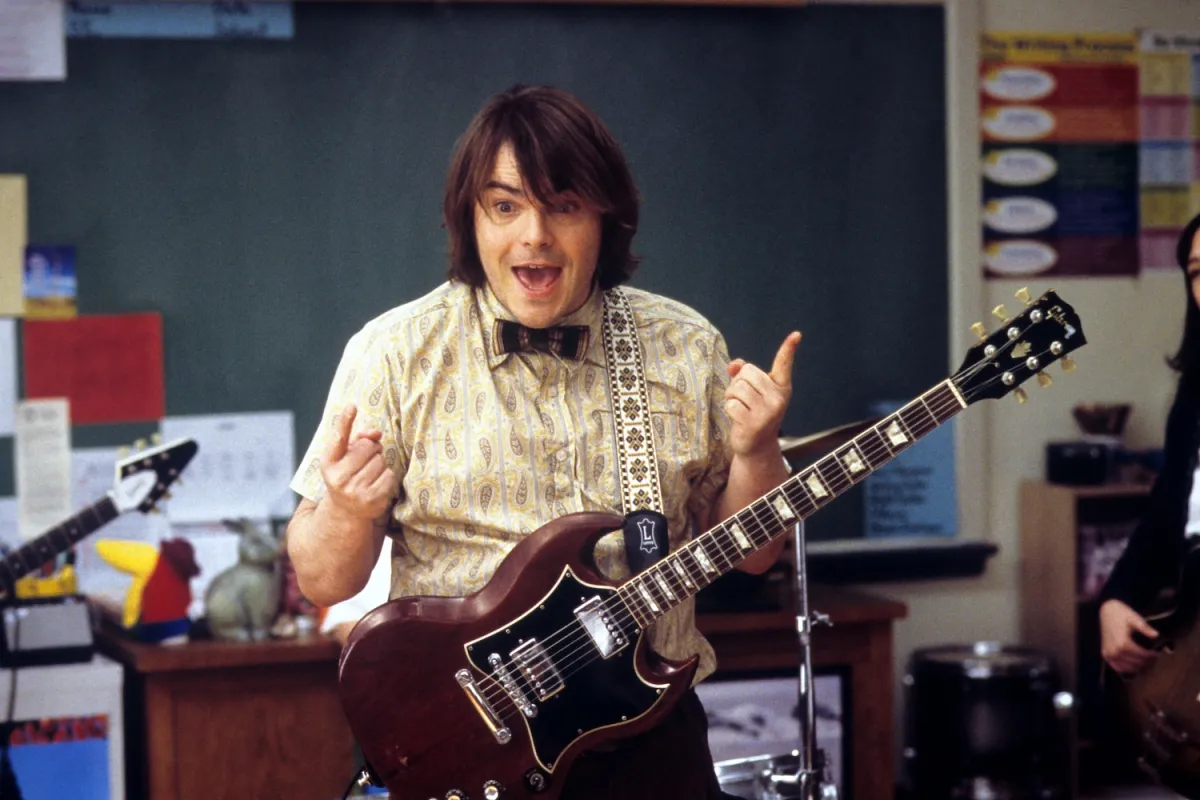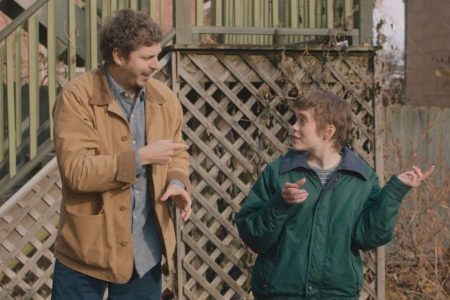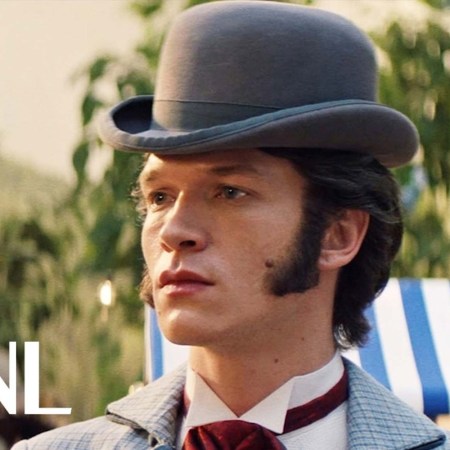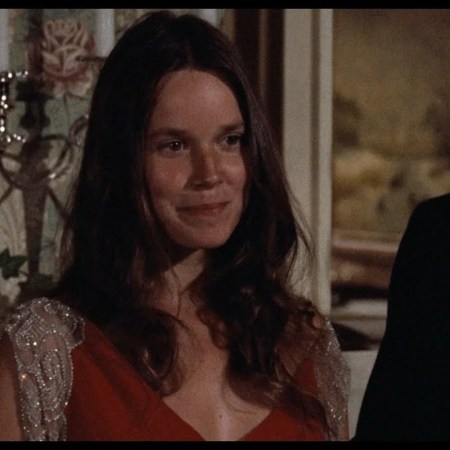Dewey Finn has a song. It’s not ready yet — he wrote it in 15 minutes, he says, but he promises it’s awesome. Still, his class of newbie musicians wants to hear what their substitute teacher has cooked up for their upcoming rock show. So he relents, takes out his pitch pipe and shares his vision: “It starts off with a dark stage, and then a beam of light, and you can see me and my guitar,” he says softly.
In the midst of reciting his opening lyrics, Dewey interjects with more atmospheric details — “a thin layer of fog comes in around my ankles” — which means his roadies will need to find dry ice. Then he turns his mouth into a five-piece band, pivoting from a percussive bass line, to a face-melting guitar lick, to a Hawaii Five-O drum beat, to backup-singer falsettos. Nearly out of breath, he concludes with a final sustained note, an imaginary explosion and raining confetti. “That’s all I got so far,” he says. “It’s a work in progress.”
It’s only 30 minutes into School of Rock, but you can tell this is Jack Black’s defining moment. Why else would director Richard Linklater capture this maniacal musician’s two-minute performance in one take, starting in close-up and slowly pulling back until its high-decibel finale? He knows there’s no reason to cut away — not when Black is air-plucking his guitar’s ascending lines, stomping his heel in propulsive rhythm and Irish jigging in rapid succession. “Legend of the Rent,” the title of this proposed headbanger, is about an unemployed grown man lacking the funds to stay in his apartment. But you’re not hardcore unless you live hardcore, so Black goes for broke, using his character’s adversity as a creative opportunity to unleash his most comedic, artistic, authentic self.
The scene all but confirms Black as a committed, chaotic and uninhibited tour-de-force and proves School of Rock could never work without him. Released 20 years ago this week, the movie follows Dewey, an obnoxious guitarist who embarrasses himself with a face-planting stage dive that gets him kicked out of his own band. Looking for a new way to pay rent, he poses as his educator roommate Ned Schneebly (Mike White, who also wrote the script) and takes a substitute teacher gig at a nearby private school. When he discovers his students have musical talent, he assembles them into a rock band, aiming to compete in a lucrative Battle of the Bands. In his pursuit, he throws out the curriculum, soundproofs the classroom and turns a bunch of privileged prep kids into strumming and drumming rebels.
Upon its release in 2003, the family-friendly comedy turned into a box office smash (it made $131 million worldwide), and its fictional songs — specifically the anthem that concludes the movie — became instant earworms. Throughout its steady run on cable, it’s influenced new generations, with a run on Broadway, Nickelodeon TV show and eventually an inspired TikTok trend. Most notably, though, it epitomized the Jack Black experience. Two decades later, School of Rock has remained the crowning achievement of his career, the rare perfect convergence of an actor and a character, crystallizing his musical expertise, innate kid-actor chemistry and man-child enthusiasm.
You could see a glimpse of those traits in High Fidelity, Black’s breakout role in which he quite literally busts into the frame using his mouth as an instrument. Inside the record store, he is a wrecking ball, bemoaning Belle and Sebastian’s dreariness over the speakers before flipping on Katrina and the Waves’ “Walking on Sunshine.” It’s an irksome move, but his tidal wave sweeps you up. When he eventually shows off his Marvin Gaye pipes on stage, most people unfamiliar with him let out the same reaction as John Cusack: “Huh? This guy?” There’s an unexpected presence and control. The goofiness is confined to a few bars, but his soul breaks through, finding a comfortable cinematic language.
If You Haven’t Seen “The Adults” Yet, You’re Missing Michael Cera’s Best Work
The actor delivers a career-best performance in the independent sibling dramedyDuring the next couple years, though, Black struggled to take the next step, showing up in farces — Saving Siverman and Orange County — to deliver punch-lines and gross-outs while stuck in arrested development. But White, a longtime friend and former neighbor, eventually knew how to showcase his gifts, writing a script around his classic rock sensibilities and vocal talents. After all, Black had already formed Tenacious D, his rock-comedy outfit with Kyle Glass, back in the mid-1990s and made six episodes of an eponymous television show. He knew how to take the spotlight. It wasn’t long before Black was scatting, shooting and kabooting throughout the classroom, finally coming into his own as an entertainer always on the verge of a one-man show.
It’s easy to remember Black that way: a hyperactive sound machine, erupting into song and dance at a moment’s notice. In School of Rock, an entire scene in which Dewey hosts an impromptu participatory song about math (did you know nine is a magic number?) is built around that very characteristic. It’s what makes him special. But it’s his physicality and dexterity that accents the high notes in his arsenal — the eyebrow twirls, the air guitar, the white-winged dove pantomiming. Black says more with his index fingers in this movie than most people can with 10 pages of dialogue. When he points at someone with a question, a task, a jolt of inspiration, his eyes expand, as though he’s just learned a secret and forged a deeper bond because of it.
Not many performers transform into their characters as effortlessly as Black does here. It requires a certain kind of magic, as well as a director who can provide the right platform. The closest comparison might be Jim Carrey in Liar Liar, whose gift for gab and childish antics work in harmony as his cursed personalities tear each other to shreds. He’s the kind of actor whose eureka moments (I’m thinking of the courtroom sequence) are so bright, you half-expect to see a lightbulb hovering over his head. Black’s histrionics work in a similar way. When he engages in song, his only trajectory is up. Good luck finding the off switch.
That’s not always a desirable quality. Just ask Principal Mullins (Joan Cusack), who has to shout at Dewey to stop him belting out a song inside his van. But Black’s musical force belies a tenderness he exhibits to his younger actors — helping one student believe he’s cool, another to embrace her body image and another to shake off his father’s bullying. Though he might be an outcast whose musical ambition has outgrown his reach, Dewey trusts in the redemptive spirit of rock and roll, using it as a form of therapy and a guiding ethos. Black makes us believe rock is a viable way to grow.
In the years since, Black’s had several opportunities to flex his comedic chops, but none of them have captured his totality like School of Rock. That’s never more clear than in the closing credits, as Dewey sings AC/DC at his newly-formed after-school music class. Like a great teacher, he gives everyone a chance at a solo, but he can’t resist taking over at the end, balling up into the fetal position and scatting out another guitar lick for as long as he can. It’s a fitting and enduring image. Black will forever be a kid sticking it to the Man.
This article appeared in an InsideHook newsletter. Sign up for free to get more on travel, wellness, style, drinking, and culture.


























